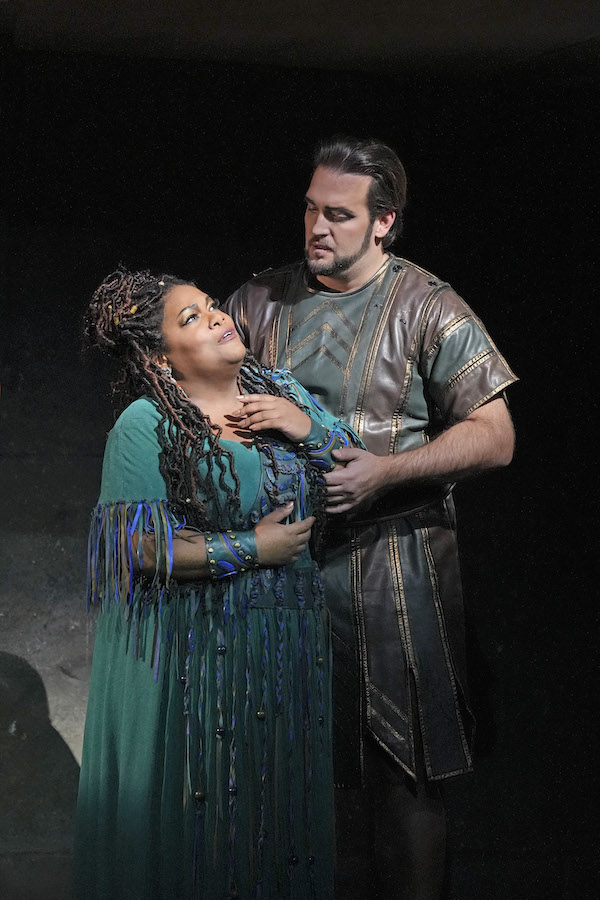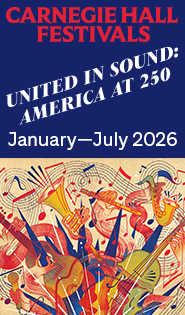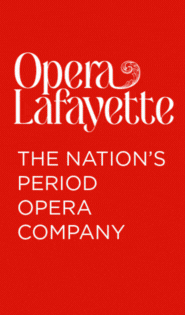Met’s “Aida” returns in worthy style for final run of Frisell’s majestic production

In 2019, the Metropolitan Opera general manager Peter Gelb announced that Sonja Frisell’s grand and glorious production of Aida would be retired. Circumstances dictated otherwise, and so it returned for one final run on Friday evening. Performed over 240 times at the Met, Frisell’s staging has put the grand in opera since it premiered in 1988.
Gianni Quaranta’s sets remain awe-inspiring. Humans are dwarfed by statues of gods, of which often only the lower portions are visible. The most spectacular scene change is In Act II, when the Memphis city gates descend from above as Amneris’ chamber is slowly lowered out of sight. For the Triumphal March, which follows, the stage is packed with choristers, trumpeters, dancers, and scores of supernumeraries.
Frisell, however, clearly delineates the private sphere from the public. Amneris’s chambers are fit for a princess, but on a scale that puts the focus on her confrontation with Aida. In the final scene, Aida and Radames express their love in a confined space beneath the massive temple where Amneris prays for peace. Intimacy is no longer something to which the Egyptian princess can aspire.
With a production of this scale, there is the potential for the cast to be overwhelmed by the visuals. Music, however, trumped spectacle in this performance with the cast which the Met assembled and conductor Paolo Carignani in the pit.
Latonia Moore made her Met debut as Aida in 2012 as a last- minute substitute for Violeta Urmana. She triumphed and has gone on to sing the role in opera houses around the world. Her emotional connection to the role is real and at its fiery best when the Ethiopian princess is caged or confronted.
Moore is a compelling Aida, but less than vocally ideal. Her high notes ring out loud and clear, soaring into the house with ease. At times, however, her soprano lacks focus and her singing is mannered. If there is an opportunity to swoop, she goes for it, and “O patria mia” suffered for those reasons. She was on far firmer vocal footing in the final act.
Brian Jagde’s youthful vigor, matinee-idol looks, and gleaming tenor made for an ideal Radames. In Act I, when most tenors appear to be on edge preparing to sing “Celeste Aida” after just a few minutes on stage, he projected a calm eagerness. Jagde is not the first tenor to ignore Verdi’s dynamic marking for morendo (dying away) on the final high B-flat but few make the note sound so easy.
Jagde was upstaged only once by a skittish horse drawing the chariot in which he made his entrance during the Triumphal March. A column perilously teetered, and the horse garnered a round of applause when it trotted off stage, but the tenor still emerged victorious.
The most fascinating and multi-faceted characterization was Olesya Petrova’s Amneris. Petrova could be imperious or fragile in the flash of an eye. She also indulged in a bit of camp; Frisell’s staging invites it. With vocal glamor on par with her physical allure, Petrova was a particularly potent Amneris.
The size and clarity of George Gagnidze’s voice made for a particularly menacing Amonasro. Ramfis, however, is not quite a fit dramatically for bass-baritone Christian van Horn, which came as a surprise since he generally commands the stage.
The Met Chorus and Orchestra sounded magnificent. A restive audience audience obliterated the opening measures of the Prelude, but the orchestra sizzled in the lead up to “Celeste Aida”. The Temple Scene was particularly effective with Carignani eliciting exquisite soft luminous sounds from both chorus and orchestra. Floating above it all was the radiant soprano of Brittany Olivia Logan, who was making her Met debut as the High Priestess.
The Met’s audience seems increasingly younger and more diverse. Many in the audience were seeing Aida for the first time. They, like those of us who have seen this production since it premiered, will never experience its like ever again. If you can, take the opportunity to savor its opulence and grandeur once again before Frisell’s Aida is gone forever.
Aida continues through May 8, with Michelle Bradley assuming the title role in January. metopera.org





Posted Dec 03, 2022 at 6:38 pm by Gillian Eddins
Agree with your comments, but please do not retire the production. We need grand opera at the moment. Such a glorious production.
Posted Dec 06, 2022 at 12:38 pm by Sharon Daly
Thank you for honoring The Met’s Grand Opera! We will not see it’s like again, or at least for many a decade.
Posted Dec 18, 2022 at 5:10 pm by Mary bray
Had to see again after my trip down the Nile! I was at those places duplicated I the scenery… just awesome. Please keep and replay every few years